CDARS - Our Team
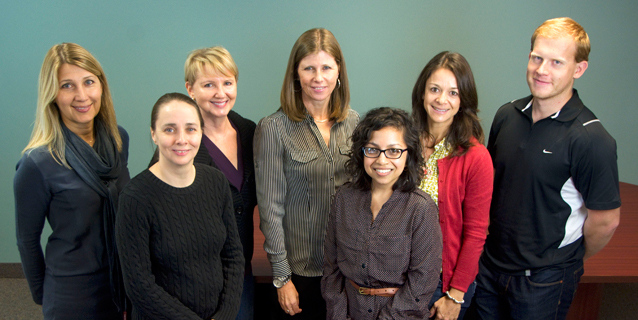
Meet the staff and students in the CDARS Lab
Scientist

Dr. Barbara Gibson’s research program investigates the intersections of social, cultural, and institutional practices in producing health, inclusion/exclusion, and identity with disabled young people. The aim is to improve the wellbeing of disabled young people through a critical interrogation of key concepts (e.g. disability/normalcy, in/dependence, quality of life) underpinning children’s rehabilitation and societal understandings of disability. The work is interdisciplinary and intersectional; drawing upon sociological studies of health, bioethics, postmodern scholarships, and critical disability studies. Dr. Gibson is a Professor in the Department of Physical Therapy at the University of Toronto and a Senior Scientist in the Bloorview Research Institute. She is a member of the Joint Centre for Bioethics and an Adjunct Fellow at the Centre for Critical Qualitative Health Research at the University of Toronto. Dr. Gibson holds the Bloorview Kids Foundation Chair in Childhood Disability Studies.
Links:
Twitter: @BarbptToronto
Centre for Critical Qualitative Health Research
University of Toronto: Physical Therapy Faculty
Research Staff
Bhavnita Mistry is the research manager for the CDARS lab. Her work critically explores the experiences of young disabled persons (children and youth) how this affects their health, wellbeing and participation using various qualitative methods. She provides research and administrative support to Dr. Gibson and all CDARS lab trainees. She received her Masters in Geography (Health Geography) from the University of Ottawa. Her research focused on how health risk information is communicated to the public, where her thesis examined the media representations of the E.coli water contamination in Walkerton, Ontario.
Bhavnita can be reached at bhavnita.mistry@utoronto.ca
Current Trainees
Dr. Katie Mah is a Postdoctoral Associate, co-supervised by Dr. Gail Teachman, Western University, School of Occupational Therapy, and Dr. Barbara Gibson, Senior Scientist, Bloorview Research Institute, in Toronto. Katie is also a trainee with VOICE: Views on Interdisciplinary Childhood Ethics at McGill University and CDARS (Critical Disability and Rehabilitation Studies unit) at Bloorview Research Institute. Employing critical qualitative and arts-based methodologies, Katie’s postdoctoral research explores how recovery following concussion is discursively understood by young people. Drawing on her background in nursing and occupational therapy, as well as her lived experience of concussion, Katie’s research aims to disrupt conventional ways of thinking and knowing about concussion and young people, while challenging clinicians and researchers to (re)imagine concussion education, care, and research.
Katie recently completed her PhD in the Rehabilitation Sciences Institute at the University of Toronto under the supervision of Dr. Nick Reed. During her doctoral studies, Katie was a trainee in the Concussion Centre at the Bloorview Research Institute, and the OAK Concussion Lab at the University of Toronto. Using critical arts-based research methods, Katie’s doctoral work explored how young people ‘at risk’ of and living with concussion thought about and acted upon encountering concussion, and how these thoughts and actions were shaped by pervasive societal ways of thinking and knowing about concussion and young people.
Mah, K., Gladstone, B., King, G., Reed, N., & Hartman, L. R. (2019a). Researching experiences of childhood brain injury: Co-constructing knowledge with children through arts-based research methods. Disability and Rehabilitation, 1–10. https://doi.org/10.1080/09638288.2019.1574916
Mah, K., Hickling, A., & Reed, N. (2018). Perceptions of mild traumatic brain injury in adults: A scoping review. Disability and Rehabilitation, 40(8), 960–973. https://doi.org/10.1080/09638288.2016.1277402


Donya Mosleh is a doctoral candidate supervised by Dr. Barbara Gibson at the Critical Disability and Rehabilitation Sciences Unit, and the Rehabilitation Sciences Institute at the University of Toronto. Drawing on her background in sociology and disability studies, Donya’s research aims to disrupt stigmatizing ideas about disability as a means to enhance the lives of disabled children. Donya’s transdisciplinary research program draws on posthumanist theory to explore how disability is understood and operationalized in the everyday clinical practices of a children’s outpatient rehabilitation clinic, and is oriented to promoting more inclusive care practices.
Donya received her Hon. BA Sociology (2013) and MA Sociology (2014) at Wilfrid Laurier University. Currently, she is a Research Assistant for the CDARS ‘Enhancing Compassionate Care’ project, which aims to explore and enhance the human aspects of care for young people with muscular dystrophy and their families. Donya is also a Graduate Editorial Assistant for the Journal of Humanities in Rehabilitation. Donya can be contacted at donyamosleh@gmail.com or d.mosleh@mail.utoronto.ca
Mosleh, D, Gibson B.E. Abnormal-Becoming-Normal: Conceptualizations of Childhood Disability in Children's Rehabilitation Textbooks. Scandinavian Journal of Disability Research.2022 April: 24(1), 122–135. DOI: https://doi.org/10.16993/sjdr.877.
Mosleh D. (Nov 2019). Critical disability studies with rehabilitation: A call for engagement and transdisciplinary scholarship. Journal of Humanities in Rehabilitation. 12 pages.
King, G., McPherson, A., Mosleh, D., Hartman, L., Rapley, J., & Pinto, M. Program opportunities of residential immersive life skills programs for youth with disabilities. Research in Developmental Disabilities, 2018;83:233-246. doi:10.1016/j.ridd.2018.09.003
Clarke J, and Mosleh D. The uses of biological sciences to justify the risk of children’s mental health and developmental disorders in North American News magazines: 1990-2012. In Crichton J, Candlin CN, Firkin, AS ed. Communicating Risk. London, UK: Palgrave MacMillan; 2016:267-287. https://doi.org/10.1057/9781137478788
Clarke J, Mosleh D.Risk and the Black American child: representations of children’s mental health issues in three popular African American magazines. Health, Risk and Society. 2015;17(1):1-14. DOI:10.1080/13698575.2014.992865
Clarke J, Mosleh D, Janketic N. Discourses about children’s mental health and developmental disorders in North American women’s magazines 1990-2012. Child and Family Social Work. 2014;21:391-400. DOI: 10.1111/cfs.12155.
Past Trainees
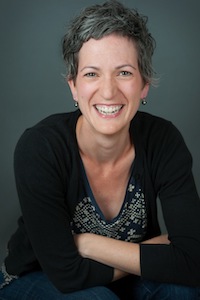
 Julia Gray is a Senior Policy Advisor in the Strategic Initiatives & Social Policy Branch in the Ontario Ministry of Indigenous Affairs. She completed a SSHRC-funded Post Doctoral Fellowship with Dr. Barbara Gibson in 2020. Her research examined hospital-based clown practices. Her program of research crosses the arts, humanities, social sciences and health sciences to improve wellbeing of disabled young people by elucidating social experiences and overturning cultural assumptions of disability/ability. Originally trained as a playwright and theatre director, with a background in dance, she is the playwright/director of several research-informed theatre projects including After the Crash: a play about brain injury, Seeing the Forest (co-written with Dr. Gail Mitchell about patient safety culture in hospitals; and most recently Cracked: new light on dementia (www.crackedondementia.ca.) Julia holds a Bachelor of Fine Arts and Master of Arts from York University’s Department of Theatre and was a CIHR Strategic Training Doctoral Fellow in Health Care, Technology and Place from 2012 to 2014.
Julia Gray is a Senior Policy Advisor in the Strategic Initiatives & Social Policy Branch in the Ontario Ministry of Indigenous Affairs. She completed a SSHRC-funded Post Doctoral Fellowship with Dr. Barbara Gibson in 2020. Her research examined hospital-based clown practices. Her program of research crosses the arts, humanities, social sciences and health sciences to improve wellbeing of disabled young people by elucidating social experiences and overturning cultural assumptions of disability/ability. Originally trained as a playwright and theatre director, with a background in dance, she is the playwright/director of several research-informed theatre projects including After the Crash: a play about brain injury, Seeing the Forest (co-written with Dr. Gail Mitchell about patient safety culture in hospitals; and most recently Cracked: new light on dementia (www.crackedondementia.ca.) Julia holds a Bachelor of Fine Arts and Master of Arts from York University’s Department of Theatre and was a CIHR Strategic Training Doctoral Fellow in Health Care, Technology and Place from 2012 to 2014.
Gray, J., Donnelly, H. & Gibson, B.E. (2021) Seriously foolish and foolishly serious: The art and practice of clowns in children’s rehabilitation. Journal of Medical Humanities. doi: 10.1007/s10912-019-09570-0 2021, Aug:42, 453-469
Gray, J., Kontos, P. (In Press) Working at the margins: Theatre, social science and radical political engagement. Research in Drama Education: The Journal of Applied Theatre and Performance. Special Issue on Theatre and Performance vs the “Crisis in the Humanities”: Creative Pedagogies, Neoliberal Realities.
Gray, J. (2019) Working within an aesthetic of relationality: Theoretical considerations of embodiment, imagination and foolishness as part of theatre making about dementia. Research in Drama Education: The Journal of Applied Theatre and Performance. Special Issue on Theatre, Dementia and Relationality, 24(1), 6-22. doi: 10.1080/13569783.2018.1535270
Gray, J. & Kontos, P. (2018) An aesthetic of relationality: embodiment, imagination and playing The Fool in research-informed theatre. Qualitative Inquiry. 24(7), 440-452. First published on-line November 9, 2017. doi: 10.1177/1077800417736331
Parsons, J. A., Gladstone, B. M., Gray, J. and Kontos, P. (2017) ‘Re-conceptualizing “impact” in art-based health research’, Journal ofApplied Arts & Health, 8(2), 155–73, doi: 10.1386/jaah.8.2.155_1

Pia Vollmers is a Care Management Coordinator at Mary Free Bed Rehabilitation in Michigan. She completed her MSc at the Rehabilitation Sciences Institute at the University of Toronto, co-supervised by Dr. Yani Hamdani and Dr. Barbara Gibson. Pia’s research explored the effects of human-animal interactions with young people with Autism Spectrum Disorder (ASD) and their families. Her work aimed to better understand the experiences of young people with ASD in order to explore how service dogs influence the wellbeing of these young people and their families.
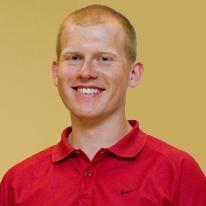
Patrick Jachyra is an Assistant Professor in the Department of Sport and Exercise Sciences at Durham University in the United Kingdom. Patrick’s research examines the psycho-social dimensions of disability, health, and well-being of neurodivergent individuals, with a particular focus on autistic people. The goal of this research is to support the physical activity, well-being, participation and inclusion of neurodivergent people in society. He completed post-doctoral training at the Centre for Addiction and Mental Health in Toronto. Prior to that, he completed a PhD in Rehabilitation Sciences with Dr. Gibson, at the University of Toronto and Holland Bloorview. As part of doctoral training, Patrick completed the Collaborative Specialization in Bioethics at the Joint Centre for Bioethics at the University of Toronto.
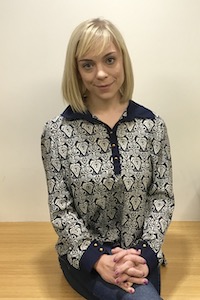
Denise DuBois was a PhD candidate supervised by Dr. Barbara Gibson in the Critical Disability and Rehabilitation Studies Unit, Bloorview Research Institute, and Dr. Emily Nalder, in the Community Integration and Participation Unit, Rehabilitation Sciences Institute (RSI). Denise was also a member of the Collaborative Program in Neuroscience. Denise is an occupational therapist with expertise intervening with youth and adults with intellectual and developmental disabilities (IDD) and/or autism spectrum disorder (ASD) and their families. Denise’s doctoral research focused on understanding the process of transition for adults with IDD/ASD and their families during residential relocation from the family home to another community location. Denise graduated from her MSc. OT from the University of Toronto in 2010 and received her Bachelors of Journalism (Honours) from Carleton University in 2008, where she specialized in health and science communication.
DuBois, D., Ameis, S. H., Lai, M. C., Casanova, M. F., & Desarkar, P. (2016). Interoception in Autism Spectrum Disorder: A systematic review.International Journal of Developmental Neuroscience, 52, 1-16.
DuBois, D., Giovanni, S., Chui, A., & Nalder, E. (2017). Capitalizing on lived experience to design a smartphone app for everyday life. Occupational Therapy Now, 19, 16-20.
DuBois, D. (2016). Managed Alcohol Programs in the community: What do they enable? rehabINK, 2. https://rehabinkmag.com/2016/10/11/managed-alcohol-programs-in-the-community-what-do-they-enable/
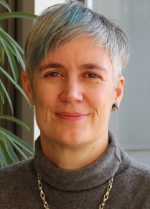
Jenny Setchell is a Senior Research Fellow in Physiotherapy at The University of Queensland since January 2019. Prior to that she was a Post-Doc with Dr. Barbara Gibson at the Critical Disability and Rehabilitation Studies Unit and held a concurrent position at the School of Health and Rehabilitation Sciences of The University of Queensland. She is the former Director of SocioHealthLab which is a interdisciplinary research collective that pursues social transformation in health and healthcare through applied socio-cultural research. Her research interests include new material and critical perspectives on healthcare broadly, and physiotherapy, disability and pain specifically. Dr Setchell was a founding member, and past co-chair of the international Critical Physiotherapy Network and a committee member of the International Society for Critical Health Psychology. For more information about her work see: https://researchers.uq.edu.au/researcher/13932

Gail Teachman successfully defended her PhD dissertation in February 2016, under the supervision of Barbara Gibson and Colin Macarthur in the Rehabilitation Sciences Institute at University of Toronto. Her interdisciplinary research demonstrated the often hidden forms of exclusion experienced by non-speaking disabled children and the unintended moral harms that are perpetrated through well-intentioned "inclusive" interventions. In recognition of her leadership and research excellence, Gail was awarded a Vanier Canada Graduate Scholarship, a Faculty of Medicine Award for Research Innovation and a CIHR Fellowship. She was one of three University of Toronto 2016 graduates awarded a Governor General’s Gold Medal; the gold medal is one of the most prestigious awards a Canadian graduate student can receive. Prior to undertaking graduate studies, Dr. Teachman worked as an occupational therapist at Holland Bloorview Kids Rehabilitation Hospital and taught as a Clinical Associate with the Department of Occupational Science & Occupational Therapy at University of Toronto. Gail is an Assistant Professor with the School of Occupational Therapy at Western University in London, Ontario and can be reached at gteachma@uwo.
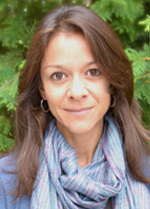
Yani Hamdani completed a PhD in Social and Behavioural Health Sciences at the Dalla Lana School of Public Health, University of Toronto in June 2016 (supervised by Rebecca Renwick and committee members Barbara Gibson and Cameron Norman). During her PhD training, she was a Fellow in the CIHR Strategic Training Program in Public Health Policy. Her PhD research examined how transition to adulthood is constituted as a problem in Ontario policies and the effects on young people with developmental disabilities and their parents. Her study showed that policies had both beneficial and unintended harmful consequences on the health, well-being and daily lives of young people and their families. Yani was awarded first place in the BRI Pursuit Award 2017 competition for her PhD research. Yani has presented her work at conferences in Canada, the U.S.A., Israel and Sweden. She is also an Occupational Therapist who worked at Holland Bloorview Kids Rehabilitation Hospital for many years before pursing her PhD. She is currently an Assistant Professor in the Department of Occupational Science & Occupational Therapy at the University of Toronto, and a Clinician-Scientist, Azrieli Adult Neurodevelopmental Centre, Centre for Addiction and Mental Health.

Dr. Coralee McLaren completed her undergraduate/graduate studies in Nursing at the University of Toronto, and worked as a Registered Nurse at the Hospital for Sick Children. Her award winning PhD dissertation focused on the relationship between children’s movement and the physical environment. During her Post-doctoral Fellowship hosted jointly by Bloorview Research Institute and CanChild Centre for Childhood Disability Research, Dr. McLaren and CDARS lead scientist Dr. Barbara Gibson co-wrote and secured a CIHR funded grant aimed at developing synergies between dance, neuroscience, architecture and education. Combining postmodern theory with artistic and empirical methods, this research seeks to gain critical insights into the relationship between movement and cognition in children with diverse abilities and optimize their physical and social interactions at school. This work draws on Dr. McLaren’s former career with the Toronto Dance Theatre and teaching experience at the associated School, York and Ryerson University Dance departments. Dr. McLaren is an Assistant Professor in the Daphne Cockwell School of Nursing at Ryerson University, and an Adjunct Scientist in the Bloorview Research Institute.
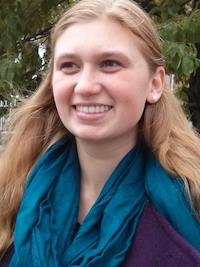
Kara Grace Hounsell began working with the CDARS lab as a Ward summer student in 2015. Her summer project focused on the ways in which personal and social perceptions of disability affect the activity preferences of children with cerebral palsy. Kara also completed an annotated bibliography, exploring the relationship between cognition and movement.
Following the Ward program, Kara was delighted to continue working with the CDARS lab, assisting with a study that explores how children with diverse dis/abilities move together. From September 2015-2016, Kara had the opportunity to observe children’s movements together, prepare ethnographic notes, and assist in data analysis.
Kara is currently studying medicine at the University of Toronto. She can be reached at kara.hounsell@mail.utoronto.ca.

Stephanie Hanson began her journey at Holland Bloorview as a summer student with the Ward Family Summer Student Research Program under the supervision of Barbara Gibson in 2008, and continued to be supervised by Dr. Gibson until 2011. In 2009, she received the Ward Family Summer Student Research Presentation award for her presentation, Assessment of Children’s Capacity to Consent for Research: A descriptive qualitative pilot study of researchers’ practices and REBs’ expectations. Stephanie has also conducted research in university, hospital, and community-based settings on early learning, autism, mental health, and youth policy.
In 2011, Stephanie completed a Master of Arts in Child Study and Education at the University of Toronto, where she received the Robert Seth Kingsley Fellowship for excellence and leadership in special education. In 2016, she completed a post-graduate Certificate in International Development at the University of British Columbia. Stephanie has worked globally with children, youth, and adults from all walks of life, including persons with disabilities, Indigenous populations, and low-socioeconomic communities. In 2017, she was selected to be featured in the Alberta Council for Global Cooperation’s 6th Annual Top 30 under 30 magazine for her work in international and community development.
Collaborators
Thomas Abrams teaches disability studies, sociological theory, and the sociology of health and illness in Queen’s University’s department of Sociology. His research applies critical social theory and philosophy to disability, rehabilitation, and social service provision. Thomas graduated from Carleton University’s sociology PhD program in 2014 and pursued postdoctoral fellowships at OISE (2014-16) and Dalhousie (2016-2018) before moving to Queen’s. He tweets @Thomas__Abrams
Relevant Publications:
Abrams, T., and Adkins, B., “Tragic Affirmation: Disability beyond Optimism and Pessimism.” Journal of Medical Humanities. Forthcoming.
Abrams, T., Setchell, J., Thille, P., Mistry, B., and Gibson, BE. (2019). “Affect, Intensity, and Moral Assemblage in Rehabilitation Practice.” BioSocieties 14(1):23–45.
Abrams, T., and Setchell, J. (2018) “Living with Death in Rehabilitation”. Human Studies. 41(4), 677-695.
Learn More About Thomas’ Work.
Yani Hamdani, PhD, OT Reg. (Ont.) is an Assistant Professor in the Department of Occupational Science and Occupational Therapy, and a Clinician-Scientist at the Azrieli Adult Neurodevelopmental Centre, Centre for Addiction and Mental Health in Toronto, Canada. She completed a PhD in Social and Behavioural Health Sciences at the Dalla Lana School of Public Health, University of Toronto in 2016. Dr. Hamdani’s research focuses on health experiences, services and policy for young people labeled with developmental disabilities. She is a registered Occupational Therapist and has a particular interest in critical qualitative inquiry and policy analysis. Learn more about Yani's work here: https://ot.utoronto.ca/about/core-faculty/yani-hamdani/
Laura McAdam MSc, MD, FRCP(C), is a Clinician Investigator and Physician Director, Child Development Program. Dr. McAdam studies the long term impact of GIVINOSTAT treatment in Duchenne muscular, bullying frequency and experiences of youth with muscular dystrophy and congenital myopathies, and the state of clinical and rehabilitation care of girls with Rett syndrome.
Marla Munk (Family Advisor) is a member of the RFEC and parent of a child with Duchenne muscular dystrophy (DMD). She has consulted on numerous projects investigating the human dimensions of living with DMD.
Dr. Gail Teachman is an Assistant Professor at Western University’s School of Occupational Therapy. As a CDARS trainee, her doctoral research contributed perspectives on inclusion from youth who use augmentative and alternative communication. The results demonstrated there is a need to challenge and expand the ways we think about social inclusion. Following postdoctoral training at McGill University, with Dr. Franco Carnevale’s VOICE team (Views on Interdisciplinary Childhood Ethics), Gail took up her current position where her program of research is focused on examining the social, cultural and political contexts that shape possibilities for children with disabilities to flourish. Learn more about Gail’s research: https://www.uwo.ca/fhs/ot/about/faculty/teachman_g.html
Patricia Thille, PhD, PT, is an Assistant Professor in the Department of Physical Therapy, at the University of Manitoba. She was awarded her PhD (Sociology) in 2015, from the University of Calgary, with funding from CIHR and The Killam Trusts. She studies stigma and chronic disease management in health services and health professions education, using qualitative methodologies and social theory. Learn more about Patty's work: http://umanitoba.ca/rehabsciences/thille.html